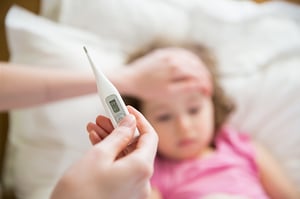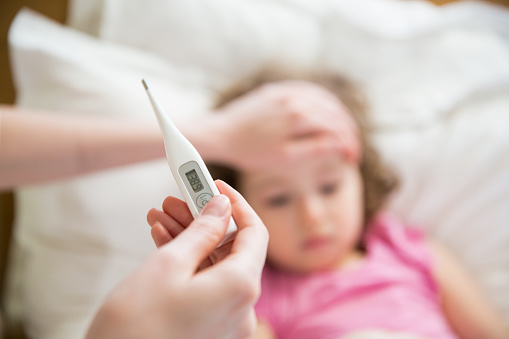Yes, it’s that time of year again — when more children wake up saying they don’t feel well. They might be coughing and sneezing or complaining about a sore throat, or their symptoms could include vomiting and diarrhea.
No matter what your child’s specific symptoms include, this typically raises two important questions:
- Is my child too sick to go to school?
- Is my child contagious?
Sometimes, the answers to these questions are pretty clear and, if you can answer “yes” to either of them, then it’s time for your child to stay home. But what if the answers aren’t entirely clear? This post will help.
Is My Child Too Sick to Go to School?
WebMD.com provides a useful guide to help you answer this question, which includes a list of three questions that the American Academy of Pediatrics suggests you consider: 
- Does your child have a fever of 101 or more? That’s usually a sign of illness, one where he or she should stay home until fever-free for 24 hours without the use of medication to lower the fever.
- Is he or she well enough to participate in class? This may not be as easy to determine but, if your child isn’t well enough to benefit from school, it’s better for him or her to stay home.
- Does your child have an illness that’s contagious, such as the flu? Contagious = the infected person stays home. (Here’s information about your child and a flu shot.)
Still not sure what to do? KidsHealth.org suggests you check in with your child’s preschool, grade school or child care center. Most of them have rules about when a child should stay home. They cite the example of strep throat, saying that schools may have a requirement that your child get a couple of doses of antibiotics before returning, which means that he or she may need to stay home for a day or two after diagnosis.
This article says you should never send your child to school if he or she is experiencing vomiting and diarrhea (or just one of the two!). Other signs that a sick day may be in order include when children “lose their appetite, are clingy or lethargic, complain of pain, are drooling with mouth sores.” They may also need a sick day if they just don't seem like themselves.
If your child has contracted certain diseases, you’ll need your doctor’s okay before he or she can return. These include chickenpox, rubella, whooping cough, mumps, measles and Hepatitis A.
Is My Child Contagious?
Parents.com created a useful guide about diseases and contagion, listing them and describing what symptoms exist with each one.
As just one example from this guide, croup generally lasts five to seven days, typically spread by a virus that causes upper airways to swell. This condition comes with a bark-like cough and, as long as your child has this cough and a fever, he or she is contagious and should stay home from school to avoid spreading the illness. Your child’s pediatrician may prescribe liquid prednisone, a steroid that can calm down inflammation, which may reduce the severity of symptoms. But this steroid does not decrease the level of contagion of the croup.
Ask Your Doctor When Unsure
In general, if you’re just not sure what to do, talk to your child’s doctor. Perhaps you can get advice over the phone by sharing symptoms, such as coughing and sneezing with a sore throat, or maybe the doctor will want to see your child in person. Better safe than sorry, so follow through on advice.




